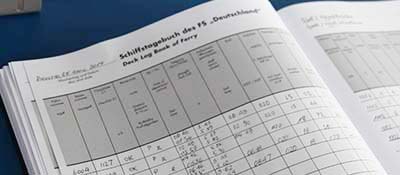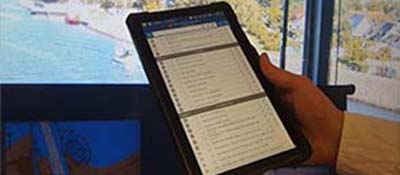Brandstwiete 1
20457 Hamburg
Oya Sönmez
Phone: +49 40 36137-239
Fax: +49 40 36137-204
Mobile: +49 171 88 53 239
Mail: oya.soenmez@bg-verkehr.de
Bundesamt für Seeschifffahrt und Hydrographie
Referat S24
Bernhard-Nocht-Straße 78
20359 Hamburg
Jochen Ritterbusch
Phone: +49 40 3190-72400
Mail: jochen.ritterbusch@bsh.de
Record books
- Record books
- Types of record books
- Entries into the record books
- Electronic record books
- Retention periods
- Record books in recreational shipping
Record books
Every sea-going ship has to carry a record book - aka logbook - to enter the most important daily events and processes chronologically. The range of entries is large and spans from navigation and ship safety to marine environment or seafarers' complaints. For the German Flag, the BG Verkehr publishes a list of matters that have to be entered into the record book of a sea-going ship.
Types of record books
According to German law, there are different types of record books on sea-going ships:
- Ship's logbooks (with bridge maintenance logbook as ancillary book)
- Engine logbooks (with sounding book and bell book as ancillary books)
- MARPOL record books regarding environmental protection (with oil, cargo and garbage record book)
- Ballast water record books
see: Form of the international Ballast Water Record Book (Resolution MEPC.369(80)) - and Medical record books (e.g. patients' register)

Entries into the record books
Entries into the record books are evidence that play a significant role in case of an accident or infringements against provisions regarding marine environment protection. That is why, it is not permitted to either make former entries in the record book unrecognizable or take out pages.
The master of a sea-going vessel is responsible for the entries into the record books. He can delegate maintaining the record book to ship's officers or other members of crew.
More information:
- List of matters that have to be entered into the record book of a sea-going ship
Electronic record books
For the German Flag, the BG Verkehr (Ship Safety Division) approves record books as hardcopy and as electronic version. The Federal Maritime and Hydrographic Agency (BSH) or a recognized organization (RO) undertakes the technical assessment of the electronic record books.
Technical provisions and approval
Technical provisions for electronic record books are:
- for record books: Electronic record books for ships – Technical specifications and operational requirements (ISO 21745).
- specifically for MARPOL record books: Guidelines for the use of electronic record books under MARPOL (MEPC.312(74)) of 17 May 2019 and
- specifically for ballast water record books: Guidelines for the use of electronic record books under the BWM Convention (MEPC.372(80)) of 7 July 2023.
Details regarding requirements and approval of electronic record books for sea-going ships flying the German Flag are available in the following information by the BG Verkehr:
Approval of electronic record books for sea-going ships under German flag
Manufacturers can apply for the approval of electronic record books for the German Flag at nautik@bg-verkehr.de and shipping companies can apply for the ship-specific approval of MARPOL record books acc. to MEPC.312(74) or ballat water record books acc. to MEPC.372(80) at certificates@bg-verkehr.de.

List of electronic record books approved for the German Flag
The following electronic record books have been approved by BG Verkehr/Ship Safety Division for sea-going ships flying the German Flag:
| Manufacturer's name | Product name | Scope of approval | Approval date |
|---|---|---|---|
| Anschütz GmbH, Kiel | Anschütz eLog |
|
14.06.2024 |
| MARSIG, Rostock | Searecs |
|
02.02.2022 |
| MariApps Marine Solutions Pte Ltd Singapore | PAL eRBooks |
|
09.06.2022 |
| NAPA Ltd. | NAPA Logbook |
|
14.06.2024 |
Retention periods
How long a record book has to be stored and data saved depends on the type of record book and the entries:
- Record books: three years, except in case of entries regarding maritime labour law five years
- MARPOL record books: three years
- Garbage and ballast water record books: two years
Record books in recreational shipping
Skippers in recreational shipping should also keep record books. According to SOLAS Chapter V Regulation 28 ships in foreign trades – and this includes recreational craft – carry records about safe ship operations on board. German law stipulates record book keeping requirements, which also apply to recreational craft, in several instruments among others these are
- any occurrences regarding safety, environment protection and occupational health and safety: German Schiffssicherheitsgesetz, sec. 6, para. 3,
- accidents: German Schiffssicherheitsgesetz, sec. 6, para. 2.
Section B of Annex 1 of the German Ship Safety Ordinance ("Schiffssicherheitsverordnung") gives details regarding format of the books, types of entries as well as retention times. For recreational craft with less than 15 m in length, facilitations have been made, for example that preprint record books are not mandatory. The "Merblatt über die Verpflichtungen der Sportschifffahrt im Hinblick auf Seetagebücher" (information on the obligations of recreational shipping regarding record books) contains further information about record books for recreational craft.

